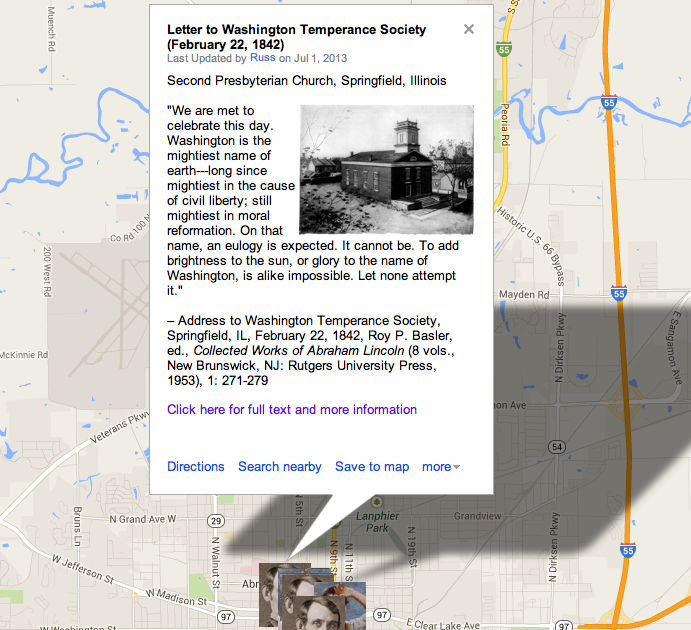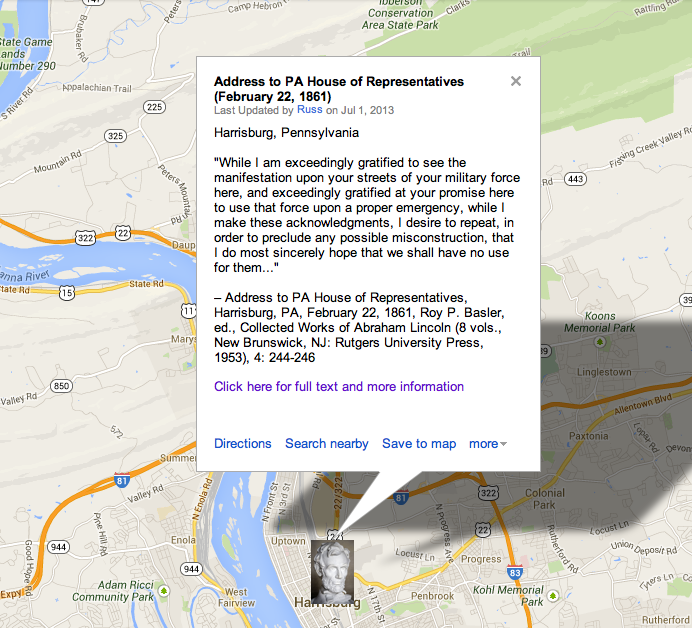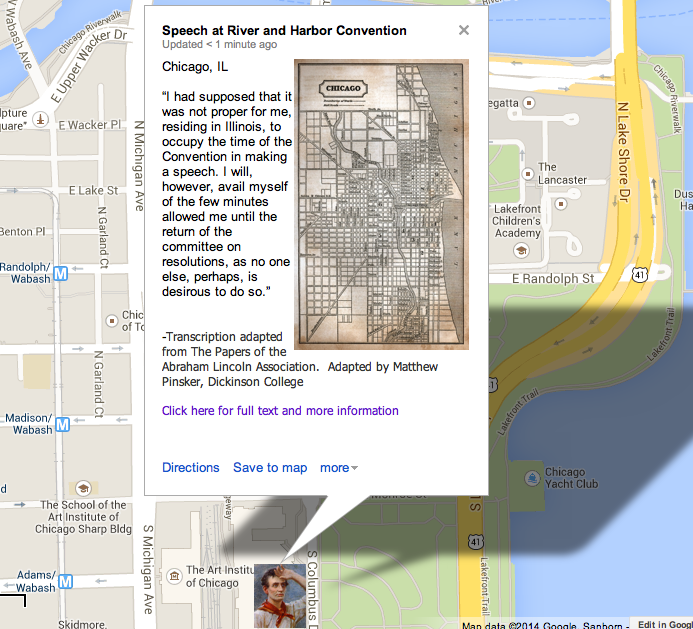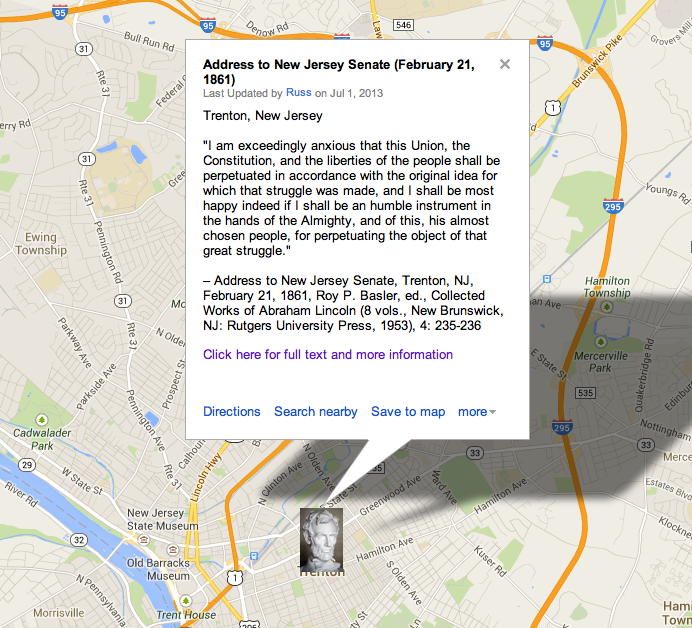Ranking
#121 on the list of 150 Most Teachable Lincoln Documents
Annotated Transcript
“…Although the Temperance cause has been in progress for near twenty years, it is apparent to all, that it is, just now, being crowned with a degree of success, hitherto unparalleled.”
On This Date
HD Daily Report, February 22, 1842
The Lincoln Log, February 22, 1842
Custom Map

View in Larger Map
How Historians Interpret
“On February 22, 1842, Lincoln addressed the Washington Temperance Society of Springfield with a speech that enlarged his discussion of reason and tyranny in the 1838 Lyceum Address. His presentation was again ostensibly apolitical, though resonant with political implications. Most notably, it added shadow and light to the portrait of human nature and the task of self-government that he had begun to produce four years before. The Lyceum Address had sketched the disturbing advances of lawless passions and the arduous means with which their tyranny could be resisted by discovering unused resources of strength within American democracy. The temperance issue presented the problem in one of its most common, dramatic, and destructive forms. Alcohol was, after all, the proverbial fuel of anger and licentiousness, a notorious destroyer of self-governing activity. Habitual drunkenness was therefore a form of slavery, perhaps one of its most damaging forms because it worked to destroy even the free man’s power to love liberty. The temperance movement was, in Lincoln’s view, an opportunity to resist the encroachment of this broader tyranny—if temperance could be pursued without the movement itself becoming a tyrannical force. There is much in this 1842 address to suggest that it served several purposes. The antebellum champions of temperance had a strong philosophical affinity for the work of the antislavery cause. In the late 1830s and early ’40s, both movement were centered in churches, from which they drew vehement supporters such as Edward Beecher. In Illinois, the Presbyterians had played a major role in both movements, and it was in a Presbyterian church in Springfield that Lincoln spoke. Temperance and abolition forces were often entwined up to the mid-1850s, when vote-seeking Republicans began to downplay antidrinking sentiments that had antagonized voters they hoped to recruit to their cause, especially Irish and German immigrants. In the early 1840s, long before the emergence of the Republican Party, Lincoln’s brand of Whig politics explicitly favored attempts to alleviate the drinker’s plight and emphasized principles he would incorporate into the explicitly antislavery speeches he began to deliver in 1854. The Temperance Address gave Lincoln an opportunity to venture, in a displaced context, ideas about emancipation and the prospects for a gradual abolition of slavery.”
–John Channing Briggs, Lincoln’s Speeches Reconsidered (Baltimore: Johns Hopkins University Press, 2005), 58-59
“Although the speech focuses ostensibly on temperance with regards to liquor, at bottom it is about temperance or moderation in speech—how citizens go about persuading one another on a given social or political issue. A close reading of the address reveals that the subtext about persuasion, and not the overt teaching about temperance advocacy, is the more serious objective of Lincoln. This becomes most evident when one looks at Lincoln’s own rhetoric, which fluctuates between plain, unornamented prose and florid, grandiose phrasing. Curiously enough, his speech takes on its most flowery and exaggerated cast when he uses biblical language. Lincoln’s Temperance Address, therefore, exhibits bot temperance and intemperance in its argument and leads the attentive listener or reader to draw conclusions about Lincoln’s opinion of the respective temperance reformers and the movement in general that are not obvious on a cursory hearing.”
–Lucas E. Morel, Lincoln’s Sacred Effort: Defining Religion’s Role in American Self-Government (Plymouth, UK: Lexington Books, 2000), 128
NOTE TO READERS
This page is under construction and will be developed further by students in the new “Understanding Lincoln” online course sponsored by the House Divided Project at Dickinson College and the Gilder Lehrman Institute of American History. To find out more about the course and to see some of our videotaped class sessions, including virtual field trips to Ford’s Theatre and Gettysburg, please visit our Livestream page at http://new.livestream.com/gilderlehrman/lincoln
Searchable Text
…Although the Temperance cause has been in progress for near twenty years, it is apparent to all, that it is, just now, being crowned with a degree of success, hitherto unparalleled.
The list of its friends is daily swelled by the additions of fifties, of hundreds, and of thousands. The cause itself seems suddenly transformed from a cold abstract theory, to a living, breathing, active, and powerful chieftain, going forth “conquering and to conquer.” The citadels of his great adversary are daily being stormed and dismantled; his temples and his altars, where the rites of his idolatrous worship have long been performed, and where human sacrifices have long been wont to be made, are daily desecrated and deserted. The trump of the conqueror’s fame is sounding from hill to hill, from sea to sea, and from land to land, and calling millions to his standard at a blast.
For this new and splendid success, we heartily rejoice. That that success is so much greater now than heretofore, is doubtless owing to rational causes; and if we would have it to continue, we shall do well to enquire what those causes are. The warfare heretofore waged against the demon of Intemperance, has, some how or other, been erroneous. Either the champions engaged, or the tactics they adopted, have not been the most proper. These champions for the most part, have been Preachers, Lawyers, and hired agents. Between these and the mass of mankind, there is a want ofapproachability, if the term be admissible, partially at least, fatal to their success. They are supposed to have no sympathy of feeling or interest, with those very persons whom it is their object to convince and persuade.
And again, it is so easy and so common to ascribe motives to men of these classes, other than those they profess to act upon. Thepreacher, it is said, advocates temperance because he is a fanatic, and desires a union of Church and State; the lawyer, from his pride and vanity of hearing himself speak; and the hired agent, for his salary. But when one, who has long been known as a victim of intemperance, bursts the fetters that have bound him, and appears before his neighbors “clothed, and in his right mind,” a redeemed specimen of long lost humanity, and stands up with tears of joy trembling in eyes, to tell of the miseries once endured, now to be endured no more forever; of his once naked and starving children, now clad and fed comfortably; of a wife long weighed down with woe, weeping, and a broken heart, now restored to health, happiness, and renewed affection; and how easily it all is done, once it is resolved to be done; however simple his language, there is a logic, and an eloquence in it, that few, with human feelings, can resist. They cannot say that he desires a union of church and state, for he is not a church member; they can not say he is vain of hearing himself speak, for his whole demeanor shows, he would gladly avoid speaking at all; they cannot say he speaks for pay for he receives none, and asks for none. Nor can his sincerity in any way be doubted; or his sympathy for those he would persuade to imitate his example, be denied.
In my judgment, it is to the battles of this new class of champions that our late success is greatly, perhaps chiefly, owing. But, had the old school champions themselves, been of the most wise selecting, was their system of tactics, the most judicious? It seems to me, it was not. Too much denunciation against dram sellers and dram-drinkers was indulged in. This, I think, was both impolitic and unjust. It was impolitic, because, it is not much in the nature of man to be driven to any thing; still less to be driven about that which is exclusively his own business; and least of all, where such driving is to be submitted to, at the expense of pecuniary interest, or burning appetite. When the dram-seller and drinker, were incessantly told, not in the accents of entreaty and persuasion, diffidently addressed by erring man to an erring brother; but in the thundering tones of anathema and denunciation, with which the lordly Judge often groups together all the crimes of the felon’s life, and thrusts them in his face just ere he passes sentence of death upon him, that they were the authors of all the vice and misery and crime in the land; that they were the manufacturers and material of all the thieves and robbers and murderers that infested the earth; that their houses were the workshops of the devil; and that their persons should be shunned by all the good and virtuous, as moral pestilences—I say, when they were told all this, and in this way, it is not wonderful that they were slow, very slow, to acknowledge the truth of such denunciations, and to join the ranks of their denouncers, in a hue and cry against themselves.
To have expected them to do otherwise than as they did—to have expected them not to meet denunciation with denunciation, crimination with crimination, and anathema with anathema, was to expect a reversal of human nature, which is God’s decree, and never can be reversed. When the conduct of men is designed to be influenced, persuasion, kind, unassuming persuasion, should ever be adopted. It is an old and a true maxim, that a “drop of honey catches more flies than a gallon of gall.” So with men. If you would win a man to your cause, first convince him that you are his sincere friend. Therein is a drop of honey that catches his heart, which, say what he will, is the great high road to his reason, and which, when once gained, you will find but little trouble in convincing his judgment of the justice of your cause, if indeed that cause really be a just one. On the contrary, assume to dictate to his judgment, or to command his action, or to mark him as one to be shunned and despised, and he will retreat within himself, close all the avenues to his head and his heart; and tho’ your cause be naked truth itself, transformed to the heaviest lance, harder than steel, and sharper than steel can be made, and tho’ you throw it with more than Herculean force and precision, you shall no more be able to pierce him, than to penetrate the hard shell of a tortoise with a rye straw.
Such is man, and so must he be understood by those who would lead him, even to his own best interest.
On this point, the Washingtonians greatly excel the temperance advocates of former times. Those whom they desire to convince and persuade, are their old friends and companions. They know they are not demons, nor even the worst of men. They know that generally, they are kind, generous and charitable, even beyond the example of their more staid and sober neighbors. They are practical philanthropists; and they glow with a generous and brotherly zeal, that mere theorizers are incapable of feeling. Benevolence and charity possess their hearts entirely; and out of the abundance of their hearts, their tongues give utterance. “Love through all their actions runs, and all their words are mild.” In this spirit they speak and act, and in the same, they are heard and regarded. And when such is the temper of the advocate, and such of the audience, no good cause can be unsuccessful….
… If the relative grandeur of revolutions shall be estimated by the great amount of human misery they alleviate, and the small amount they inflict, then, indeed, will this be the grandest the world shall ever have seen. Of our political revolution of ’76, we all are justly proud. It has given us a degree of political freedom, far exceeding that of any other of the nations of the earth. In it the world has found a solution of that long mooted problem, as to the capability of man to govern himself. In it was the germ which has vegetated, and still is to grow and expand into the universal liberty of mankind.
But with all these glorious results, past, present, and to come, it had its evils too. It breathed forth famine, swam in blood and rode on fire; and long, long after, the orphan’s cry, and the widow’s wail, continued to break the sad silence that ensued. These were the price, the inevitable price, paid for the blessings it bought.
Turn now, to the temperance revolution. In it, we shall find a stronger bondage broken; a viler slavery, manumitted; a greater tyrant deposed. In it, more of want supplied, more disease healed, more sorrow assuaged. By it no orphans starving, no widows weeping. By it, none wounded in feeling, none injured in interest. Even the dram-maker, and dram seller, will have glided into other occupations so gradually, as never to have felt the shock of change; and will stand ready to join all others in the universal song of gladness.
And what a noble ally this, to the cause of political freedom. With such an aid, its march cannot fail to be on and on, till every son of earth shall drink in rich fruition, the sorrow quenching draughts of perfect liberty. Happy day, when, all appetites controled, all passions subdued, all matters subjected, mind, all conqueringmind, shall live and move the monarch of the world. Glorious consummation! Hail fall of Fury! Reign of Reason, all hail!
And when the victory shall be complete—when there shall be neither a slave nor a drunkard on the earth—how proud the title of that Land, which may truly claim to be the birth-place and the cradle of both those revolutions, that shall have ended in that victory. How nobly distinguished that People, who shall have planted, and nurtured to maturity, both the political and moral freedom of their species.
This is the one hundred and tenth anniversary of the birth-day of Washington. We are met to celebrate this day. Washington is the mightiest name of earth—long since mightiest in the cause of civil liberty; still mightiest in moral reformation. On that name, an eulogy is expected. It cannot be. To add brightness to the sun, or glory to the name of Washington, is alike impossible. Let none attempt it. In solemn awe pronounce the name, and in its naked deathless splendor, leave it shining on.




